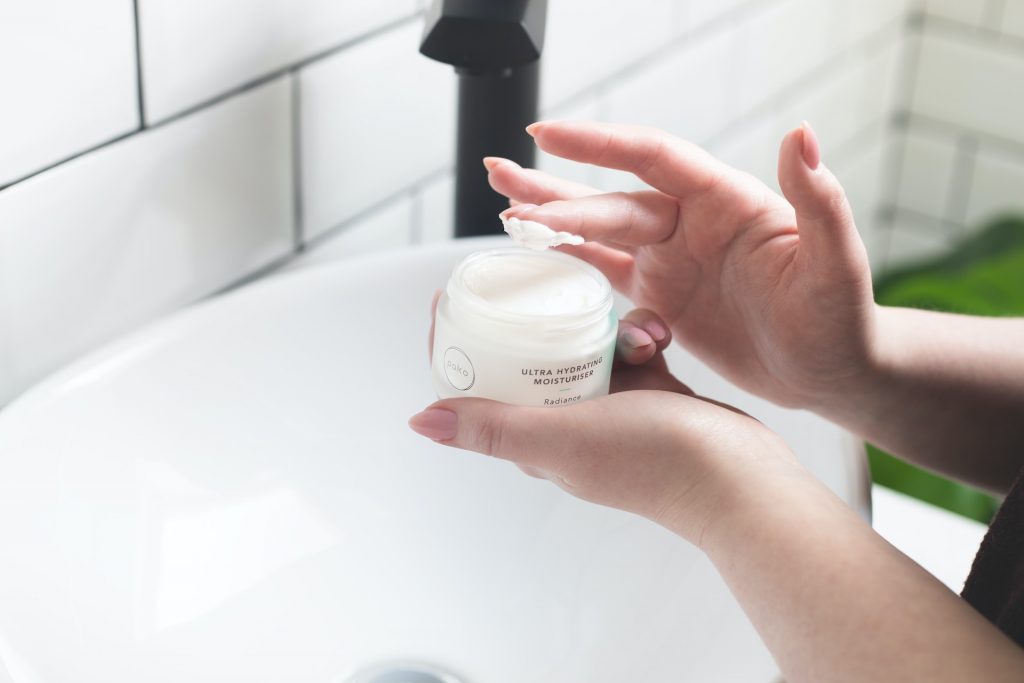Your skin works hard every day to protect your muscles, tissues, and internal organs from damage. As a result, your skin is regularly exposed to the elements and can easily become dehydrated without the right attention. This article will discuss the importance of proper hydration for skin health, including both topical options and oral hydration through food and drink.
Topical Options
In this section, we will discuss topical options for skin hydration, including:
- Gentle cleansers
- Avoiding over-cleansing
- Hydrating ingredients
- Sunscreen
- A heavier night-time moisturizer
- Weekly exfoliation
- Hydrating sheet masks
- Thermal water spray
- Taking shorter, cooler temp showers and baths
Gentle Cleansers
Harsh cleansers deplete the natural moisturizing factors and oils in your skin and can cause your skin to become cracked, dry, or lead to eczema. Instead, opt for gentle cleansers free of chemical exfoliants like alpha hydroxy, glycolic acid, or salicylic acid.
Avoid Over-Cleansing
Using cleansers affects the health of your skin’s microbiome. Only wash your face twice a day: once in the morning and once at night before bed. Over-cleansing your skin strips away its natural microbiome and moisturizing barrier agents.
If you need to wash your face more than twice a day, like after a particularly intense workout, putting on a light moisturizer after a cleanser will help replace lost hydration.
Hydrating Ingredients
Three types of hydrating ingredients should be part of your skincare routine:
- Emollients such as ceramides, fatty acids, and squalane
- Humectants such as glycerin and hyaluronic acid
- Occlusives such as beeswax, mineral oil, and petroleum
Emollients support the function of the skin barrier, which improves the appearance and texture of your skin.
Humectants bind water into the outer layer of the skin, but they are only effective when used with emollients and occlusives. Occlusives form an inert layer on the skin and prevent water from evaporating into the skin.
To minimize the number of skincare products you need to use, look for products that combine all three of these ingredients.
Sunscreen
Free radicals from the sun’s ultraviolet (UV) rays can damage the skin barrier and cause your skin to become dry and irritated. A broad-spectrum sunscreen containing titanium dioxide or zinc oxide forms a physical barrier between your skin and UV rays and keep your skin hydrated.
A Heavier Night-Time Moisturizer
Use a hydrating moisturizer immediately after washing your face, but the moisturizer you use at night should be heavier than the one you use during the day. Using a heavier moisturizer at night, like one that contains ceramides, petroleum, and squalane, can help prevent moisture evaporation while you sleep.
Weekly Exfoliation
Exfoliating once or twice a week will eliminate dead skin cells and help your moisturizers absorb better. But exfoliating your skin too often can cause dryness and irritation and even destroy the skin barrier. Use a humectant like glycolic acid or lactic acid to exfoliate your skin.
Hydrating Sheet Masks
Using a hydrating sheet mask once a week will increase the water content of your skin. Sheet masks containing ingredients like aloe, green tea, hyaluronic acid, oat extract, vitamin A, vitamin C, and vitamin E will hydrate and soothe your skin.
Taking Shorter, Cooler Showers And Baths
Water temperature matters for skin hydration when bathing or showering. Hot showers and baths draw moisture out of your skin. For best results, stick to short, lukewarm showers and use a body wash to maximize hydration, such as a body wash containing hyaluronic acid.
Dermaplaning Cosmetic Treatments
The constant allure of movie and television stars and A-list celebrities can quickly make the notion of living up to such ideals seem impossible. Thankfully, many services, cosmetic treatments, and services have recently emerged to help you feel and look your best.
An active and busy lifestyle can stress out and age your skin. The dermaplaning process combines a surgical and facial blade to gently exfoliate dead skin, revealing a fresh, new layer with an increased capacity to absorb skincare products fully.
Dermaplaning in Palo Alto helps revitalize the radiance of your skin while working to reduce acne and visible aging signs. This specialty cosmetic treatment is readily available via a quick call or online booking.
Oral Hydration Through Food And Drink
In this section, we will discuss methods of oral hydration through food and drink, including:
- Water
- Water-rich and antioxidant-rich foods
- Healthy fats
- Avoid dehydrating beverages and foods
Water
Drinking plenty of water is essential to overall health and contributes to skin hydration. However, simply drinking water is not enough to maintain proper skin hydration. Address the other variables of skin hydration, including your diet, environment, lifestyle, and skincare routine.
Water-Rich And Antioxidant-Rich Foods
Eating foods that contain high amounts of water and antioxidants helps maintain skin health. Beets, mushrooms, and spinach are rich in antioxidants and water.
Healthy Fats
Healthy fats are essential for the proper functioning of the skin barrier. Nuts, olive oil, seeds, and fatty fish like mackerel and salmon contain significant amounts of omega-3 fatty acids that support skin health.
Avoid Dehydrating Drinks And Foods
Alcohol, excessive amounts of caffeine, and foods and beverages with high amounts of sodium and sugars all cause systemic dehydration and cause your skin to look dull, non-plump, and sallow. Limiting your intake of dehydrating drinks and foods and ensuring you drink plenty of water after indulging in them can help keep your skin hydrated and healthy.
Final Words
Your diet, environment, lifestyle, and skincare routine impact skin health and hydration. You can effectively keep your skin hydrated year-round by using a combination of techniques, including topical options like cleansers, moisturizers, and sunscreens and oral hydration through food and drink such as water, antioxidant-rich foods, and healthy fats.
